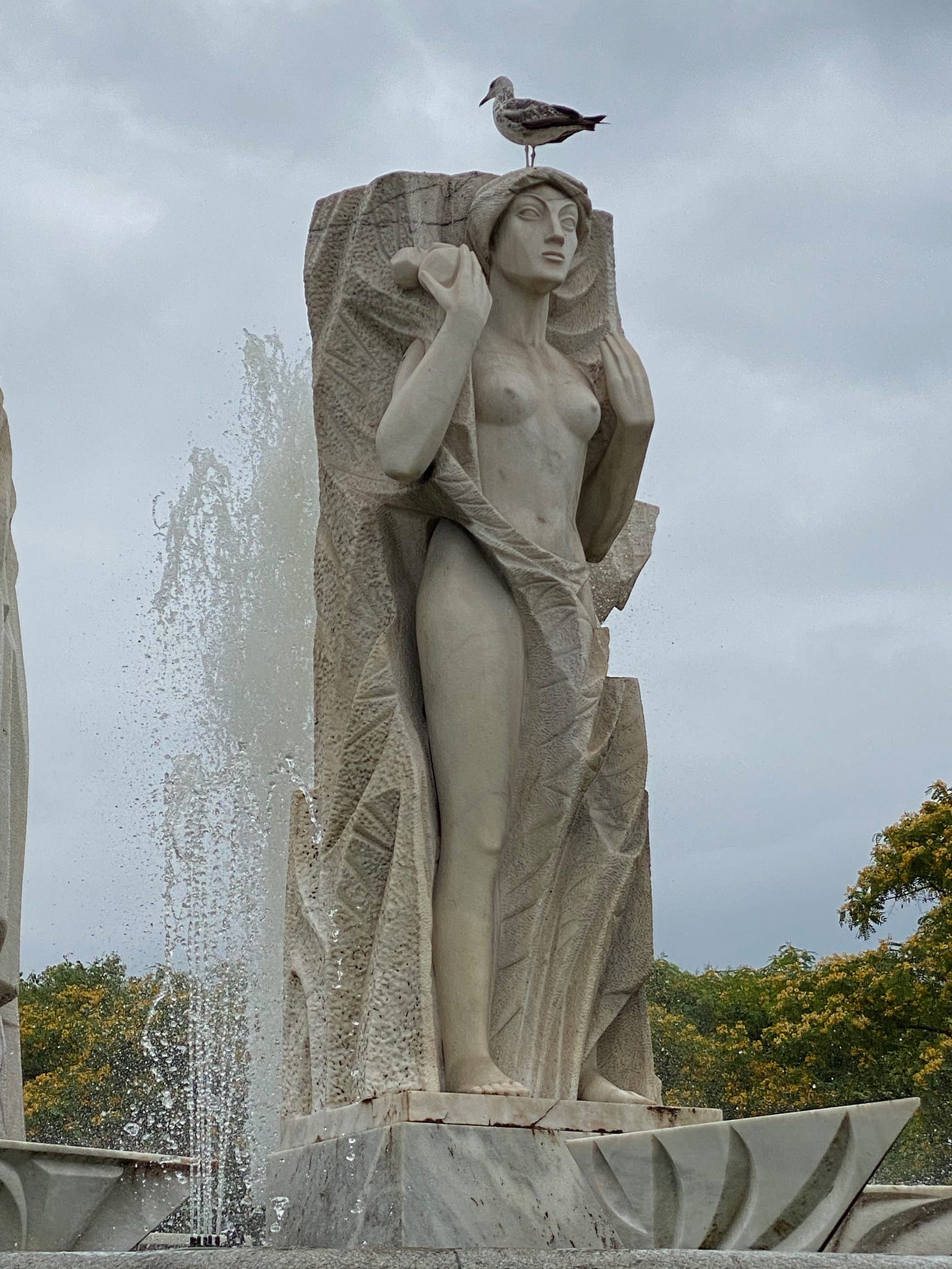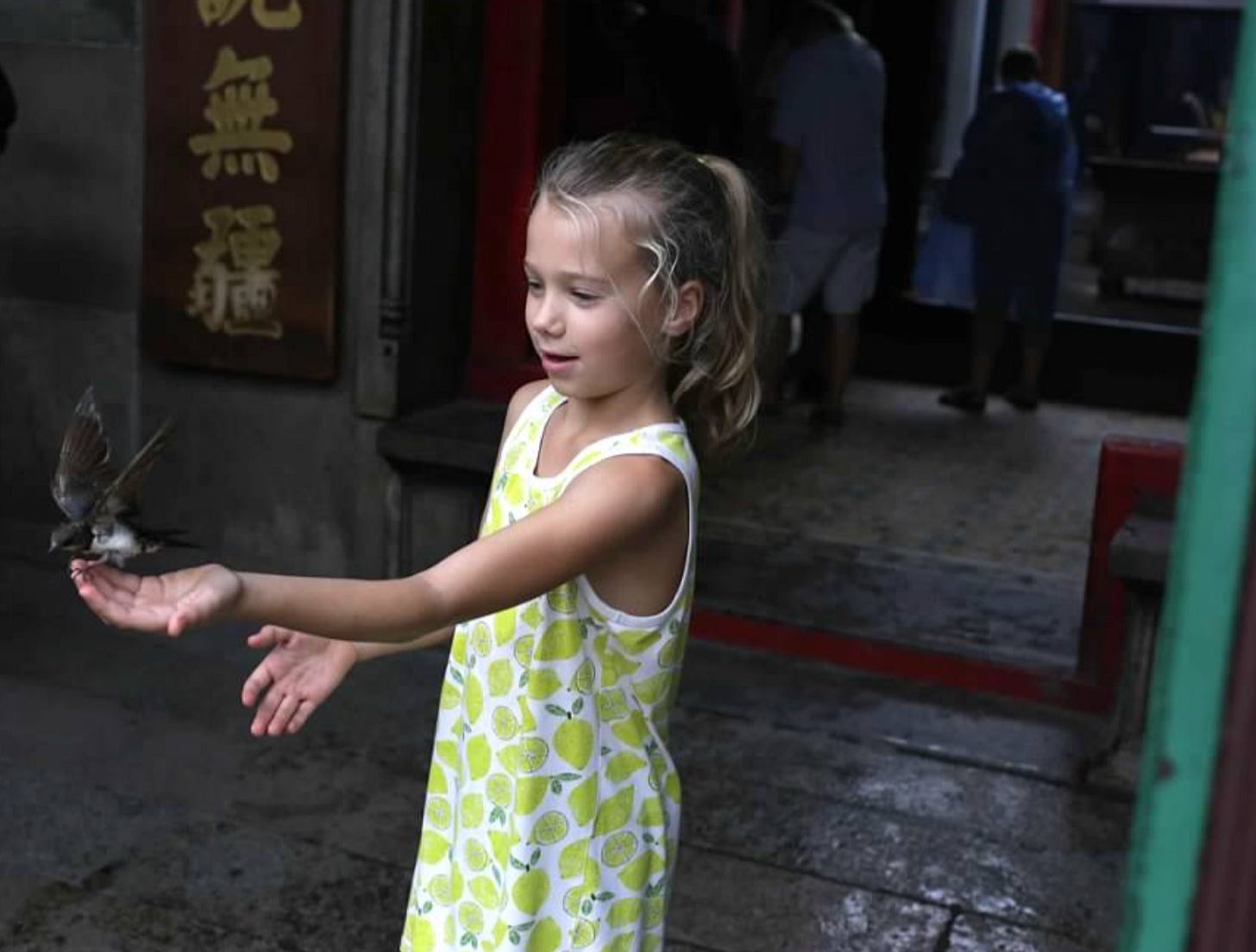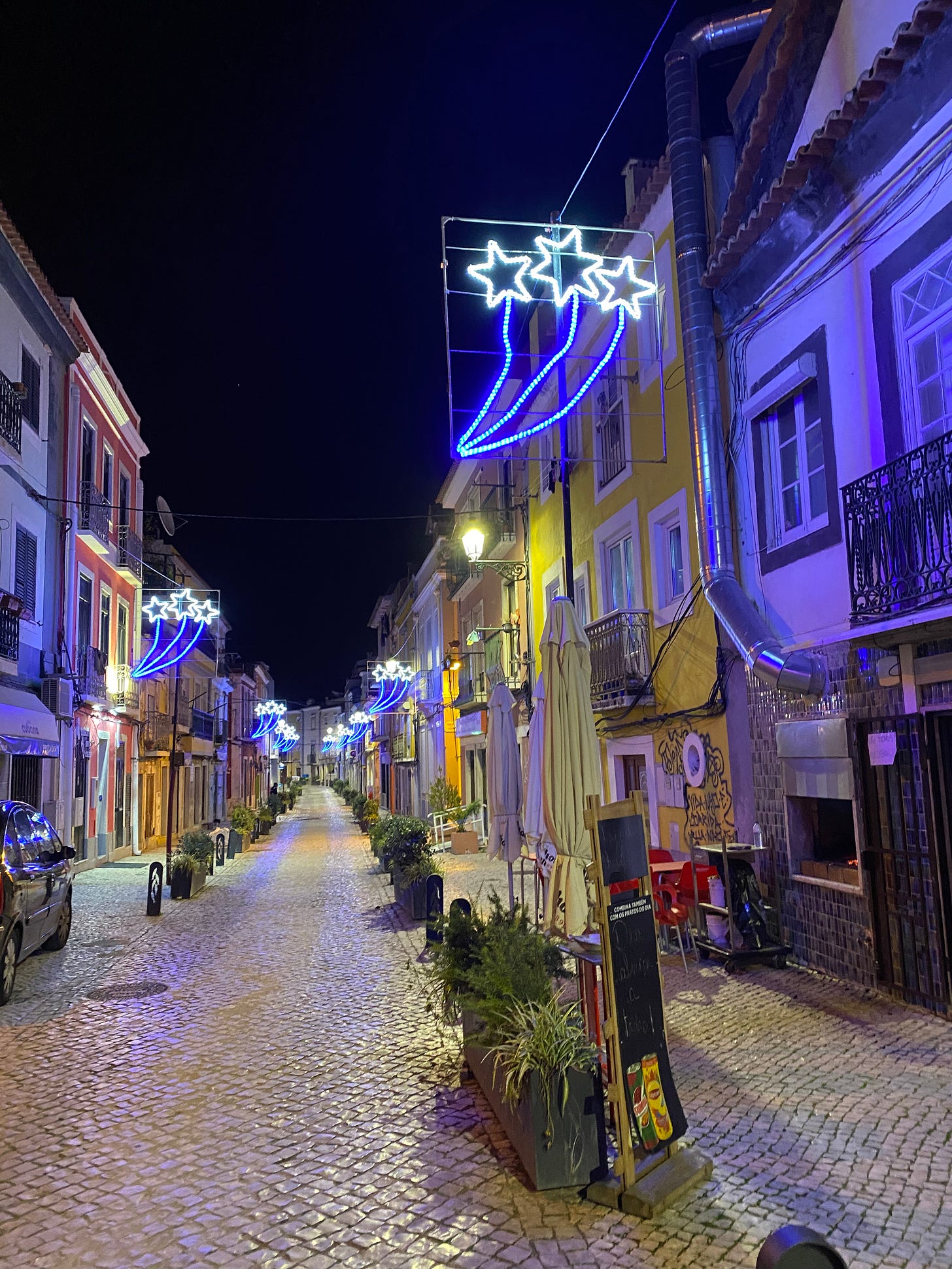
The texts started to roll in on Thursday afternoon as my friends and family in the States woke up. “Happy Thanksgiving! What are you doing to celebrate today?”
It took a minute for me to orient myself to a holiday frame of mind, because for us it was just Thursday. Or, in my new vocabulary, “quinta-feira.” (Learning the days of the week in Portuguese is really tricky for my brain. I have to count on my fingers to remember that Thursday is the 5th day of the week.)
On Thursday afternoon, Filha was in school, Marido was on a plane flying home from Amsterdam, and I was in my office tackling a tagline for a tech company’s upcoming ad campaign. Thanksgiving wasn’t anywhere on my mind.
I could say it’s because I don’t like turkey, and that would be true.
I could say it’s one of my least favorite holidays (tied neck-and-neck with every anticlimactic New Year’s Eve ever), and that would also be true.
But honestly, Thanksgiving lost its luster ‘round about the time I grew up and began to understand that the story surrounding it, like so many stories the United States tells about itself, is a fabricated patchwork of wishful white thinking.
As a child, I loved the family feast. My mother would decorate the windows with printed paper posters of “traditional” Thanksgiving scenes featuring round-faced, cherubic Precious Moments-esque characters. The Pilgrims in their austere black-and-white, their buckle hats. The “Indians” (as we called them back then) arriving with cheerful whitewashed faces; bearing platters heaped with fresh corn, jaunty feathers tucked in their headbands.
What friends, all of them, sharing a turkey leg! What a wonderful thing. What an American thing, I was taught to believe. Melting pot and all that jazz.
The reality, of course, is far less charming.
There are many historical accounts of what really happened between the Pilgrims and the Wampanoag in the 1620s. The more I read about it, the more I learn how wrong I’ve been all these years, and the more offensive that wide-eyed Precious Moments depiction becomes.
Recently, I read this article by Eryn Dion and was struck anew not just by the inherent arrogance, greed, and violence of our forefather’s eminent domain mindset, but by the way we consistently ignore the stories of indigenous people. How we reduce them to simpleminded folk, so happy to play second fiddle to the colonizers. How eager we are, always, to center the white people in the stories we use to remember the world.
As the article says: “The traditional story of Thanksgiving, and by extension the Pilgrims—the one repeated in school history books and given the Peanuts treatment in ‘A Charlie Brown Thanksgiving’—doesn’t start in 1620, with the cold and seasick Pilgrims stepping off the Mayflower onto Plymouth Rock.
It also doesn’t start a year later, with the Pilgrims and the native Wampanoag all sitting together to ‘break bread’ and celebrate their first successful harvest and a long, harmonious relationship to come.
It doesn’t start there because those things never happened, despite being immortalized in American mythos for generations…
When the Mayflower anchored off what is now known as Provincetown, the Pilgrims found themselves not in a vast, untouched land held for them by divine providence, but amid indigenous people wary and distrustful of Europeans, and the complex politics of rival tribes.
It’s hard to separate the Pilgrims from what the United States would eventually become. It’s easy to believe they arrived here seeking religious freedom and intending to eventually form their own country based on those ideals, said David Silverman, a George Washington University professor
‘Many white Americans hold it very dear, the idea that the main impetus for colonization was the search for religious freedom,’ he said. ‘If you ask the general public, even educated people, that's the most common explanation. It's not right.’”
What actually happened is a long tale “soaked in the blood of Native Americans and built on the backs of slavery.” But that’s not a very inspirational origin story. That’s not how we Americans want to see ourselves.
The article makes that point well and is worth reading in its entirety. “There’s a reason this part of the story did not make it into school history books and pageants or get remembered on Thanksgiving… ‘I think the only way forward is to understand the history the way that it happened,’ Steven Peters, a spokesman for the Mashpee Wampanoag Tribe, said… ‘It’s not a fun story,’ but its telling brings the focus away from the white Europeans, the Pilgrims, and shifts the balance back to the people who were harmed. Its telling builds the empathy that has been sorely lacking when it comes to Native American lives.”
As more of us Americans (especially us white Americans) become aware of the true story behind this holiday, the focus has begun to shift away from fictitious Pilgrim feasts and more toward a time of gratitude and general thankfulness, of family time and “Friendsgiving” potlucks. And though it’s not yet a federal holiday, the Friday after Thanksgiving is now recognized in half of the 50 states as Native American Heritage Day.
That recognition, of course, is offset by the gaudy cacophony of consumerism as Black Friday, Cyber Monday, and the inevitable Christmas shopping frenzy take over. Even here in Portugal, where Thanksgiving isn’t a thing and Friday is called “sexta-feira,” Black Friday signs are endemic. It’s baffling. I don’t quite know what to do with it, though I feel a ridiculous urge to apologize for this gross American export.
Our family’s observance of Thanksgiving changed drastically in 2017. Then in first grade, Filha started getting an entire week off for the holiday instead of just Thursday and Friday. As we discussed what to do with this unexpected gift of free time, we hit upon the idea of fleeing the country—of ignoring Thanksgiving altogether.
We traveled to Vietnam, a country Marido had long wanted to visit. We spent the week savoring dishes of com tam and Filha’s favorite, Banh xeo, as we explored the streets of Saigon, the waters of the Mekong Delta, and the (rainy) charm of Hoi An. Thanksgiving there was just Thursday.
The next year we followed up with a trip to Rome, Naples, Pompeii, and off-season Capri. I don’t remember what we ate on Thanksgiving Thursday that year, but I’m going to bet it was pizza, pasta, and gelato.
All that to say, we have set ourselves a precedent for ignoring Thanksgiving, so this year wasn’t an anomaly. We did have an invitation to an American-style turkey dinner. We thought about it for a moment, but it didn’t take long for all three of us to agree that Thanksgiving is a holiday we’re happy to leave behind.
On the way to school on Thursday Filha said, “The only thing about Thanksgiving is that I really liked when we would make lists about what we were thankful for.”
“Oh baby,” I replied, “we don’t have to wait for Thanksgiving to do that!”
By dinnertime (delivery, ordered from a nearby Turkish restaurant), Filha had changed the topic of our lists from gratitudes to Top Five Most Wanted Superpowers. It seemed weirdly fitting.
My Super Power Wish List:
1. The ability to read, write, speak, and understand any language
2. The ability to teleport
3. The power to heal
4. The power to destroy
5. Once I get in shape, I want the power to stay in shape forever
Filha’s List:
1. Advanced artist skills (easy to make great animations/art in general)
2. Time travel
3. Shapeshift (into anything)
4. Instantly healing anything, even bringing people/animals back from the dead. Successfully. No zombies.
5. The ability to punish those who deserve it!
Bonus: The power to jump into the world of a book/movie/imaginary world
Marido’s List:
1. Speak, read, and understand the language of my wife and daughter
2. Extreme Dad Joke Power!
3. The power to spend my life with my family, having an adventure (to which Filha, who was transcribing our lists, responded, “WE ALREADY ARE DOING THAT!”)
4. To power to want only what I need and to have everything I need
5. The power to give Filha the wisdom she needs for life without her having to go through the hard lessons

I know I’ve been phrasing it as “giving up” Thanksgiving or “leaving it behind,” “letting it go.” That makes it sound like a diet. Or like we’re making some big sacrifice. But that’s inaccurate, because it feels like we’re (in the process of) getting far more than we’re giving up.
And while there are certainly some of our traditions that we’ll cling to (exploring-a-new-beach day on Christmas is going to be epic this year), it feels wrong-headed to try too hard to layer our Americanisms on top of Portugal.
We learned this lesson last month with Halloween, which has long been a favorite holiday of ours. It’s slowly becoming popular in Portugal—part of the seemingly unavoidable influx of American culture. But the costumes, the mood, the trick-or-treating was nowhere near the scale of what Filha was used to in our Outer Sunset neighborhood of San Francisco.
Maybe, we decided, instead of trying to recreate Halloween here, we should embrace new-to-us holidays. I’ve heard that everyone goes all-out for costumes at Carnaval, in February. So maybe that’s our new costume party tradition. In the meantime, Thanksgiving or no, there’s no shortage of holiday sentiment.
The lights started appearing here around the first of November. From big-city Lisbon to tiny Quinta do Anjo, there are lights literally everywhere.
This photo is only the smallest, smallest glimpse of the way Portugal goes all-out for Christmas. In Setúbal alone, there are the requisite streets full of lights, but also Christmas tree-shaped luminaries at the roundabouts, a Christmas village, street vendors with roasted chestnuts, a rowdy, light-bedazzled carnival (replete with spinny rides, bumper cars, and cotton candy) in Largo José Afonso that will last through the 9th of January.
So no, we didn’t celebrate Thanksgiving. But we are full to the brim of things to be thankful for, and well-supplied with plenty of cheer. On a phone call with one of my best friends Thanksgiving evening (evening for me, morning for her), I said, “Seriously, they don’t do Christmas in the States like they do in Europe. You’ve never seen anything like it!”
I think she’s already booking her ticket for a 2022 Portugal Holiday Extravaganza.
Copyright © 2021 LaDonna Witmer










I joined my wife’s family for thanksgiving. I always grinch at thoughts of gratefulness knowing the true history. This year one of the fathers ask the children ages 8-12 to say one thing they were grateful for. It touched me being in this pandemic and all but host, the family figure of grand papa refused. Said in his French accent that it was “stupid”. Stupid. One of the 8 year olds asked, but “Papa aren’t you grateful you play tennis every day?” Flabbergasted and left without a come back he ceded and agreed with his grandchild. So whether it’s Turkeys or pizza for the children’s sake make it a joyful greatful event. Change it to Thanksforbeing day!
"...a fabricated patchwork of wishful white thinking." great line, thank you for your words, LaDonna.